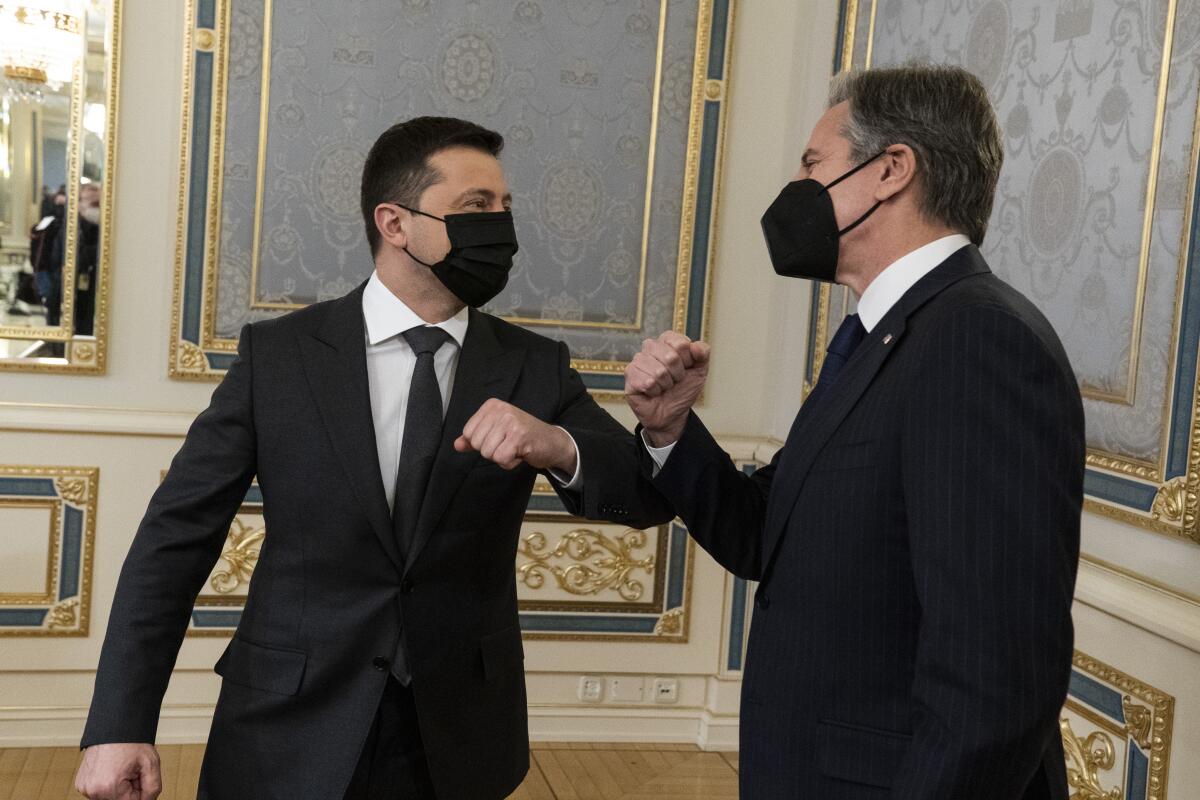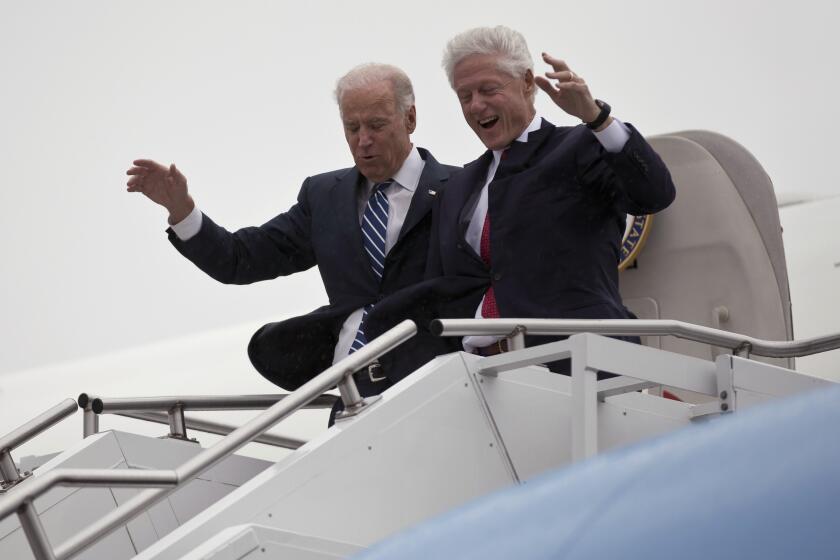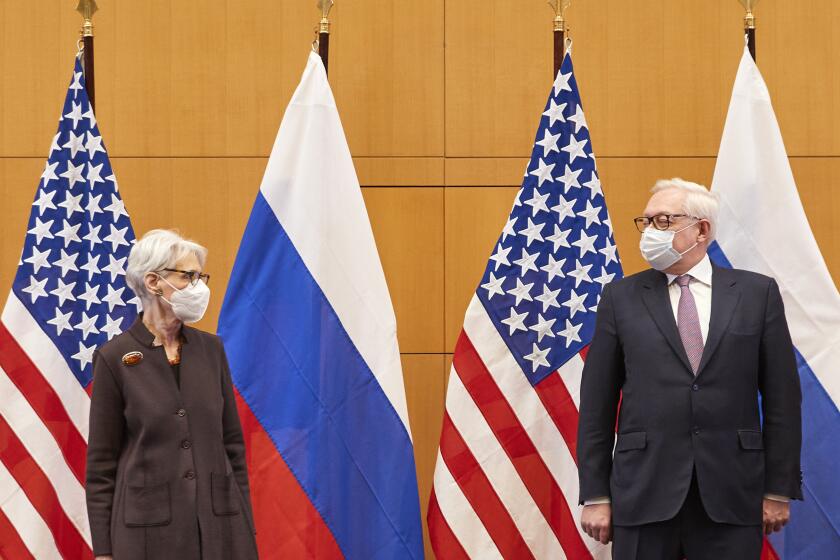Column: Ukraine’s president may be our only hope

- Share via
One can only sympathize with Ukrainian President Volodymyr Zelensky.
Vladimir Putin has a dagger aimed at the heart of Ukraine. For months he has mobilized troops along the Ukrainian border. The recent deployment of troops to Ukraine’s almost undefended border with Belarus raises the possibility of a blitzkrieg strike against Kyiv, the capital.
Zelensky has every reason to lose his cool. And yet, he seems to be the only player in this crisis keeping his eye on the ball. In response to President Biden’s gaffe about how a “minor incursion” into Ukraine would probably elicit a more restrained response from America and NATO, Zelensky tweeted: “We want to remind the great powers that there are no minor incursions and small nations. Just as there are no minor casualties and little grief from the loss of loved ones.”
Biden and Clinton are very different types of “centrists.”
On Friday, he chastised Western powers, including the U.S., for fomenting panic by talking about how a devastating war is now imminent and perhaps inevitable. “These signals have come even from respected world leaders, who speak openly and with undiplomatic language. They say simply ‘tomorrow there will be war.’ This is panic,” he said. Zelensky reportedly delivered this message to Biden directly.
Sure, Russian officials insist war is the furthest thing from their minds. Putin and his subalterns claim this is defensive deployment. At the U.N. on Monday, Russian ambassador Vassily Nebenzia accused America of “whipping up tensions and provoking escalation,” repeating that the last thing Russia wants is war. “You are almost pulling for this,” he said to the American ambassador to the U.N., Linda Thomas-Greenfield. “You want it to happen. You’re waiting for it to happen, as if you want to make your words become a reality.”
Putin is a master of asking for the whole store so he can settle for a shopping cart full of free goodies — so the U.S. must be cautious in its security talks about Ukraine.
Contrary to a growing chorus of commentators in the U.S., mostly on the right, who have rallied to Putin, this is balderdash. In affairs of state, yes, words matter. But you know what speaks even louder? Massing battalions of tanks, artillery and 100,000 troops at your border, almost surrounding a neighboring nation.
Even if that didn’t send a clear message, Russia’s claim that an invasion of Ukraine is unthinkable shouldn’t pass the laugh test. Remember, it’s Putin who invaded Ukraine in 2014 and who has actively supported insurgents in eastern Ukraine ever since.
Zelensky correctly argues that the U.S. should have implemented sanctions against Russia already, both to signal that Putin’s de facto threat of war is itself unacceptable and to give Putin a taste of how bad things could be if he keeps up his aggression. Of course, Zelensky has a very real incentive to solve the challenge at hand.
The problem is that everyone else wants to talk about the problem they want to have rather than the problem we face. France, per usual, wants to prove it is a great power unto itself and demonstrate its independence by following an independent diplomatic track. Germany is going its own way too, but not because it wants to preen. It’s still hobbled by guilt over World War II and entangled with Russia culturally and economically, especially because of its dependence on Russian natural gas.
The Biden administration at times seems more interested in proving the glories of diplomacy in all things, the solidity of the NATO alliance, and Joe Biden’s own foreign policy expertise. Given his low approval ratings, which never recovered from the Afghanistan fiasco that arguably helped invite this crisis, the administration would also like Biden not to look weak. These are all understandable priorities, but one can see why they are not Zelensky’s top concerns. Still, the administration can be commended for at least understanding the stakes.
Meanwhile, responsible Republicans like Sen. Rob Portman are quietly trying to play a constructive role. Sen. Mitch McConnell recently said that the Biden administration is “moving in the right direction.”
The problem is they’re too quiet, drowned out by much louder voices on the right that are increasingly taking a pro-Putin stance and imposing their domestic culture war agenda on the crisis. Tucker Carlson of Fox News bizarrely insists that “NATO exists primarily to torment Vladimir Putin,” as if Putin’s propaganda and paranoia are the voice of reason. Carlson asserts that America is “pushing Ukraine to join NATO.” It isn’t.
Some on the right have even convinced themselves that the West is hostile to Putin because he opposes the West’s pro-gay agenda. Others are simply letting partisanship cloud their judgment. Nikki Haley, who was the U.S. ambassador to the U.N. under President Trump, offers the not-so-helpful advice that Biden and Vice President Kamala Harris should “resign” (which would make Nancy Pelosi president).
One can only hope that it’s Zelensky’s voice that prevails amid the din.
More to Read
A cure for the common opinion
Get thought-provoking perspectives with our weekly newsletter.
You may occasionally receive promotional content from the Los Angeles Times.













